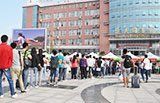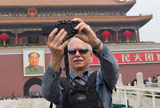Ex-Taiwan leader brought island closer to mainland
By PENG YINING (China Daily) Updated: 2016-05-21 07:22Throughout his two terms, Taiwan's former leader Ma Ying-jeou brought the island closer to the mainland, increasing the number of tourists, business deals and talks across the Straits to a level not thought possible a decade ago, experts say.
The mainland and Taiwan have built political trust during the past eight years and have improved cooperation in many fields and reduced conflict on international affairs, said Ma Xiaoguang, spokesman for the State Council Taiwan Affairs Office.
During Ma Ying-jeou's tenure, 23 agreements were signed, including cooperation on trade and civil aviation.
One month after the meeting in November between President Xi Jinping and Ma Ying-jeou, the heads of cross-Straits affairs on both sides talked on a new hotline.
According to a poll in Taiwan last week, 47 percent of the island's residents were satisfied with Ma's efforts in handling cross-Straits relations, a higher satisfaction rate than he got for other work. Chen Shui-bian, Ma's predecessor, got 21 percent when he left office in 2008.
On Monday, Ma said both sides have reached a consensus of peaceful development, and he hopes Taiwan's new leadership could maintain the current "traffic rules", and use the cross-sea bridge of "peace".
"The momentous meeting between Xi and Ma pushed cross-Straits relations to a new level. Without the mutual endorsement of the One-China principle, none of those accomplishments would have happened," said Huang Jiashu, a professor of Taiwan studies at Renmin University of China.
He said closer cross-Straits ties not only benefit Taiwan financially, but also give the island wider space internationally, referring to the World Health Assembly, which Taiwan will participate in as an observer on Monday.
Liu Guoshen, dean of the Taiwan Research Institute at Xiamen University in Fujian province, said Ma and the KMT have been criticized for being too cautious to push forward reform.
"Ma did a lot of work to improve Taiwan people's livelihoods, but in the bigger environment of the global economic decline, people are increasingly complaining," Liu said.
- Students from Taiwan praise life on mainland
- HK experts call for moderation with Taiwan
- Mainland's Taiwan affairs authorities' statement on cross-Straits ties
- Demonstrators urge Taiwan's new leader to recognize 1992 Consensus
- US urged to 'properly tackle Taiwan question'
- Taiwan fruits to Pingtan hit record high in April
- What is that thing? Innovative bus looks like a moving tunnel
- Chang'e 5 lunar probe to land on Moon and return in 2017
- 'Occupy' protester convicted on three counts, magistrate says
- Adoptions decline after one-child policy dropped, fewer abandoned children
- AIAA awards Chinese scientist its top prize
- Xi calls for action to revive the economy of northeast
- Li vows fairness for big data investment
- Taiwan's new leader 'must clarify stance' on one China principle
- Island school shows its unique character
- Children scale 800-meter cliff on way to school








